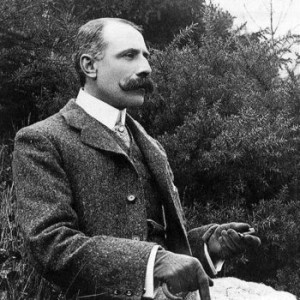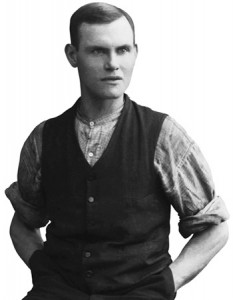One of the greatest advantages of coming from a moneyed background is that you can pursue literary or artistic achievement full-time, without having to worry about making a living. George Orwell’s experiences between the wars supporting working class writers brought home just how hard it could be to sustain long, developed artistic projects without resources.
But one of the core ideas behind the Laughing Garreteer is that constraints can be taken advantage of. Here is a set of real-life examples: writers, musicians and artists who, starting out without any advantages over ordinary people at all, went on to create works that still enthrall us all today. The sheer demand on creativity, on time management, on husbanding resources, that financial and employment constraints impose can be astonishingly fruitful as the lives of these Garreteer heroes reveal.
Philip Larkin

Philip Larkin’s two novels and four collections of poetry – to say nothing of his jazz reviewing and huge non-fiction output – were all written during time off from full-time work, work which often took him through from seven o’clock in the morning until nine o’clock at night. Nevertheless, Britain’s poets have had twenty-five years since his death to surpass him as the greatest post-War poet, and none of them have gotten close. Everyone knows that Larkin was a librarian, and many know that he was librarian at the University of Hull. But what is less often understood is that he was an outstanding, pioneering, inspirational librarian at a time when that profession was growing fast and moving into new fields of activity. His festschifts aren’t just for poetry: his colleagues in academic librarianship celebrated his achievements in his day job with an essay collection too. Kingsley Amis recalled:
“I was once sitting behind a newspaper in the (University of) Swansea common room while two engineers, i.e. lecturers in engineering, therefore by common consent philistines, chatted together. One was telling the other about a recent visit to Hull. I pricked up my ears. The chap was full of praise for everything he had seen, ‘especially the library. This fellow Larkin there [neither of the two, clearly, had any idea of what else Philip did] has transformed the place. Oh, a real live wire, myn.‘ When I told Philip this he showed, not the gratification I had unthinkingly expected, but the look of a man whose guilty secret has been revealed.”
Larkin also pioneered the archiving of living writers’ papers in the UK and chaired countless committees for bodies representing writers, librarianship and other areas of academic life. As a boss at the University Library at Hull, he inspired huge loyalty through his eagerness and encouragement to staff wanting to develop their careers.
And still there was the real work: the novels and poems, written in pencil in notebooks on trays in a series of bedsits and small flats, evening after dedicated evening, through declined invitations, lost opportunities (“all you never had of goods and sex” ‘Money’ from High Windows, 1974) and the determination that the work was more important than the life. Jake Balakowsky has this page microfilmed.
Sir Edward Elgar

It’s not widely appreciated, but Sir Edward Elgar was humbly born, and largely self-taught. His father, who played the organ at his church, ran a music shop near Worcester Cathedral, and tuned pianos for a living; his mother came from a family of agricultural labourers. In later life, Elgar remembered, ‘my first music was learnt in the Cathedral … from books borrowed from the music library, when I was eight, nine or ten. They were barbarously printed in eight different clefs, all of which I learnt before I was twelve.’ Having taught himself to play the violin, with some assistance from a musician, Frederick Spray, Elgar left school at 15 and became a clerk in a solicitor’s office. Failing there, he retreated to his father’s music shop, and from the scores and tutorial books therein embarked upon his self-education in classical music.
Until his fortieth year, Elgar supported himself with a mixture of shop-work, music teaching, conducting and small-time composing, and, for the latter part of his thirties, his wife’s income. Only then was he really able to make his name, with the performances of Imperial March and Caractacus.
Between 1897 and 1910, his Violin Concerto, Pomp and Circumstance marches, Cockaigne, Dream of Gerontius and Nimrod Variations turned him from a regional musician and national unknown into the uncontested master of English classical music. Although he’d go out of fashion somewhat in the years before his death, he’d go on to conduct Yehudi Menuhin and involve himself in pioneering recording and filming endeavours.
His home is now a museum, and his statue, in Worcester, was unveiled by the Prince of Wales. Elgar is now regarded as without question the greatest English composer since the death of Purcell, but given his early struggles, his lack of easy opportunity and frequent discouragement – and, above all, his arrival in middle age with his ambitions almost entirely unfulfilled – he is also the ultimate exemplar of the vital importance of never giving up on what matters most. The dam broke late for Elgar, but break it did.
Alfred Williams

At the age of fourteen, Alfred Williams, son of a Welsh woodworker, began work as a hammerman in G.J. Churchward’s Great Western Railway works at Swindon. It was there, in conditions unimaginably harsher and more dangerous than anything faced by Elgar, that he began his self-education at the age of twenty:
“At the forge, however, the steady persistence of my efforts towards self-improvement was not appreciated. Day after day the foreman of the shed came or sent someone with oil or grease to obliterate the few words of Latin or Greek which I had chalked upon the back of the sooty furnace in order to memorise them. Even my tool-boxes and cupboard, always considered more or less private and sacred, were periodically smeared with fat and the operation was often carried out in a very offensive manner.”
He taught himself to paint, wrote plays, poetry, autobiographical works and studies of rural life that are still of value today.
No reader of his account of Swindon works, Life in a Railway Factory (1915) can come away without the profoundest regard for Williams’ personal courage and sheer belief in the value of education, knowledge and understanding for its own sake.
Ill-health drove Williams out of Swindon in 1914, and although he was called up to fight in the Great War, it’s perhaps just as well that he was posted to India rather than to the cold and mud of the trenches. He was poor for all of his life, but, refusing to allow that to prevent him from following his own path, he became one of the great recorders of rural life, song and tradition – his works on this are still anthologised and reprinted regularly – a published poet, a political writer and a translator of Sanskrit. The house in which he died, aged 53, he’d built with his own hands from stones from an old cottage and an abandoned canal lock.
Today, his work in collecting folk song and tradition before it disappeared gives him hero status amongst folk musicians and historians. There is a society dedicated to his memory, and a superb website. A musical about his life has been performed on the site of Swindon Works and is available on CD.
It is hard to imagine any modern life facing comparable obstacles to those Williams overcame. Indeed, his lifelong poverty – this is one story that does not end with the Order of Merit or the offer of the Laureateship – shows something else: you can fail to overcome your obstacles entirely, but beat them enough to do what is in your heart and soul to do. In that, Williams is no old-fashioned figure, no ghost from a difficult past, but a man wholly inspiring and contemporary.

A very interesting article and a delight for us (the Alfred Williams Heritage Society) to see Alfred Williams included. We formed our society with the sole aim of making more people aware of Alfred’s inspirational story and his otherwise undervalued literary legacy – both of which have tremendous value in the 21st century. So thanks for spreading the word. Thanks, too, for the compliment about our website, http://www.alfedwilliams.org.uk.